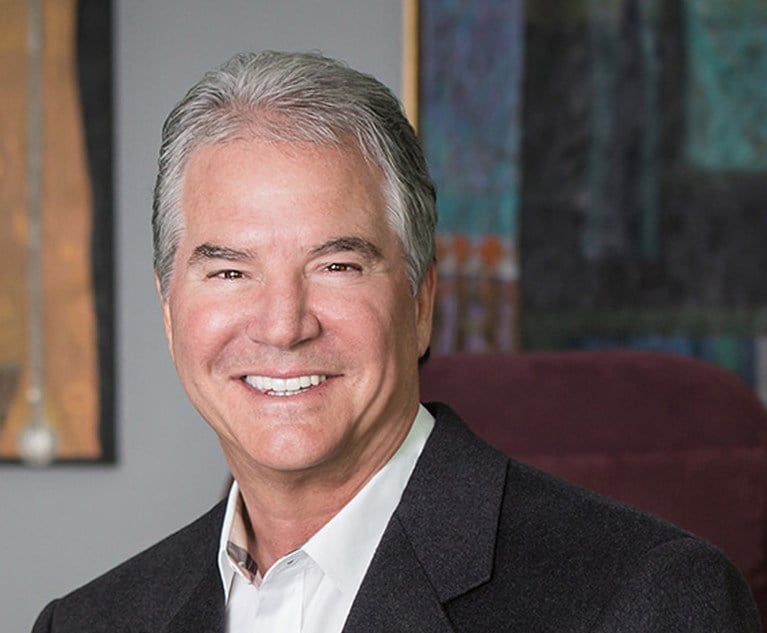Law School Offers Crash Course in Pot Law
The University of the Pacific McGeorge School of Law is hosting a workshop on the ins and outs of legal pot in California, and the risks and obstacles marijuana businesses face.
January 24, 2018 at 02:42 PM
4 minute read

What are the risks involved with starting a marijuana business?
What does the ongoing federal ban on marijuana mean for California's recent legalization of recreational cannabis?
What kinds of insurance should cannabis-related ventures have?
Those are some of the questions professors at the University of the Pacific McGeorge School of Law and marijuana experts will answer at a Feb. 2 workshop covering the basics of entering the burgeoning legal cannabis industry.
“This is going to be a $20 billion-a-year business just in California, as adult use launches. It's a massive economic event,” said McGeorge professor Francis Mootz III. “There is confusion, as things get settled. Lawyers are poring over this, figuring out how it works. [Marijuana] is going from state illegal to heavily state regulated, so it's this whole culture shift that has to take place.”
The McGeorge workshop is just the latest example of law schools wading into the hazy issue of legal pot. A growing number of schools now offer courses on marijuana law and the policy issues surrounding legalization. Vanderbilt University Law School professor Robert Mikos published the first-ever casebook on marijuana law in 2017.
And several law schools have already hosted conferences for attorneys who represent marijuana industry clients. The University of Denver Sturm College of Law co-sponsored a two-day conference in July with the Cannabis Law Institute. Seattle University School of Law has for the past five years held the Northwest Marijuana Law Conference, which examines trends in Washington and other states where cannabis is legal.
McGeorge's upcoming executive training session, which is being hosted by the school's Capital Center for Law & Policy, is unique in that it isn't strictly targeted at attorneys. Rather, it's designed to help a wide array of people get a handle on the opportunities and risks associated with pot, from those who would like to become involved in some way in the marijuana industry to the lawyers, real estate brokers, insurance agents and other professional services providers who want to assist clients in that space. The program is also geared toward state regulators who want the lay of the marijuana land, Mootz said.
“Folks who have already been in this business have obviously been sort of underground—they aren't generally hiring lawyers, accountants and insurance brokers,” he said. “But it's really a complex regulatory scheme. We think it will be beneficial for lawyers to get an understanding of the issues, but it is a broader outreach to folks who are business owners and even state regulators to understand how it works.”
The topic is particularly timely in California, where the sale of recreational marijuana became legal on Jan. 1. Just days later, U.S. Attorney General Jeff Sessions announced that the U.S. Department of Justice would no longer follow the 2013 marijuana guidelines established by the Obama administration that advised U.S. attorneys to deprioritize the prosecution of marijuana crimes in states that have legalized cannabis. (Marijuana remains illegal under federal law.) The McGeorge workshop will address that development and what it could mean for pot businesses.
“Attorney General Jeff Sessions' Jan. 4 announcement that the Department of Justice will no longer follow Obama-era policies towards cannabis regulation has sent ripples through the industry,” said McGeorge professor Michael Vitiello, a marijuana law expert who will present at the workshop. “Experts in the field are unsure what the long-term effect is, but some predict increasing chances of Congress reversing that position.”
This content has been archived. It is available through our partners, LexisNexis® and Bloomberg Law.
To view this content, please continue to their sites.
Not a Lexis Subscriber?
Subscribe Now
Not a Bloomberg Law Subscriber?
Subscribe Now
NOT FOR REPRINT
© 2025 ALM Global, LLC, All Rights Reserved. Request academic re-use from www.copyright.com. All other uses, submit a request to [email protected]. For more information visit Asset & Logo Licensing.
You Might Like
View All
Assessing the Second Trump Presidency’s Impact on College Sports


LSAT Administrator Sues to Block AI Tutor From Using ‘Famous, Distinctive’ Test Prep Materials
3 minute readTrending Stories
- 1Bribery Case Against Former Lt. Gov. Brian Benjamin Is Dropped
- 2‘Extremely Disturbing’: AI Firms Face Class Action by ‘Taskers’ Exposed to Traumatic Content
- 3State Appeals Court Revives BraunHagey Lawsuit Alleging $4.2M Unlawful Wire to China
- 4Invoking Trump, AG Bonta Reminds Lawyers of Duties to Noncitizens in Plea Dealing
- 522-Count Indictment Is Just the Start of SCOTUSBlog Atty's Legal Problems, Experts Say
Who Got The Work
J. Brugh Lower of Gibbons has entered an appearance for industrial equipment supplier Devco Corporation in a pending trademark infringement lawsuit. The suit, accusing the defendant of selling knock-off Graco products, was filed Dec. 18 in New Jersey District Court by Rivkin Radler on behalf of Graco Inc. and Graco Minnesota. The case, assigned to U.S. District Judge Zahid N. Quraishi, is 3:24-cv-11294, Graco Inc. et al v. Devco Corporation.
Who Got The Work
Rebecca Maller-Stein and Kent A. Yalowitz of Arnold & Porter Kaye Scholer have entered their appearances for Hanaco Venture Capital and its executives, Lior Prosor and David Frankel, in a pending securities lawsuit. The action, filed on Dec. 24 in New York Southern District Court by Zell, Aron & Co. on behalf of Goldeneye Advisors, accuses the defendants of negligently and fraudulently managing the plaintiff's $1 million investment. The case, assigned to U.S. District Judge Vernon S. Broderick, is 1:24-cv-09918, Goldeneye Advisors, LLC v. Hanaco Venture Capital, Ltd. et al.
Who Got The Work
Attorneys from A&O Shearman has stepped in as defense counsel for Toronto-Dominion Bank and other defendants in a pending securities class action. The suit, filed Dec. 11 in New York Southern District Court by Bleichmar Fonti & Auld, accuses the defendants of concealing the bank's 'pervasive' deficiencies in regards to its compliance with the Bank Secrecy Act and the quality of its anti-money laundering controls. The case, assigned to U.S. District Judge Arun Subramanian, is 1:24-cv-09445, Gonzalez v. The Toronto-Dominion Bank et al.
Who Got The Work
Crown Castle International, a Pennsylvania company providing shared communications infrastructure, has turned to Luke D. Wolf of Gordon Rees Scully Mansukhani to fend off a pending breach-of-contract lawsuit. The court action, filed Nov. 25 in Michigan Eastern District Court by Hooper Hathaway PC on behalf of The Town Residences LLC, accuses Crown Castle of failing to transfer approximately $30,000 in utility payments from T-Mobile in breach of a roof-top lease and assignment agreement. The case, assigned to U.S. District Judge Susan K. Declercq, is 2:24-cv-13131, The Town Residences LLC v. T-Mobile US, Inc. et al.
Who Got The Work
Wilfred P. Coronato and Daniel M. Schwartz of McCarter & English have stepped in as defense counsel to Electrolux Home Products Inc. in a pending product liability lawsuit. The court action, filed Nov. 26 in New York Eastern District Court by Poulos Lopiccolo PC and Nagel Rice LLP on behalf of David Stern, alleges that the defendant's refrigerators’ drawers and shelving repeatedly break and fall apart within months after purchase. The case, assigned to U.S. District Judge Joan M. Azrack, is 2:24-cv-08204, Stern v. Electrolux Home Products, Inc.
Featured Firms
Law Offices of Gary Martin Hays & Associates, P.C.
(470) 294-1674
Law Offices of Mark E. Salomone
(857) 444-6468
Smith & Hassler
(713) 739-1250







